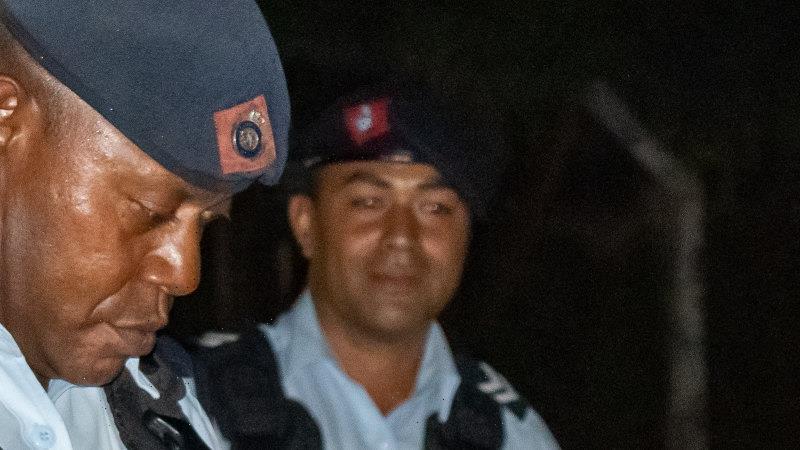The Fijian military has been called in to help police maintain order as political turmoil continues after the Pacific nation’s election last week.
Prime Minister Frank Bainimarama lost power after 16 years when the kingmaker Social Liberal Democratic Party (SODELPA) sided with opposition parties to form a tripartite alliance.
Fiji Police set up checkpoints around the country in Suva, on December 18, following the election.Credit:Getty Images
The police force has now called in the military to assist with “the maintenance of security and stability”, citing reports of stoning targeting the homes and businesses of Fijians of Indian descent.
Bainimarama met with Policing Minister Inia Seruiratu, Military Commander Major General Jone Kalouniwai and Police Commissioner Sitiveni Qiliho, where the action was decided unanimously.
“The continuous attacks on minority groups has aggravated the current tense situation,” Qiliho said in a Thursday statement.
“While the army and navy personnel have been called in to assist, police will continue to lead the overall security operations.”
The nationalist FijiFirst government has refused to concede the election after the coalition announced it had the numbers to take power.
Fijian Prime Minsiter Bainimarama Josaia Voreqe after he casts his vote on December 14 in Suva.Credit:Getty
FijiFirst will command 26 seats while People’s Alliance will have 21, the National Federation five, and SODELPA three. This puts 29 seats in the hands of the coalition, three more than Fiji First in the expanded 55-member parliament.
Attorney-General Aiyaz Sayed-Khaiyum said the prime minister and all ministers remained in power until the parliament officially votes on a new prime minister.
He also attacked the New Zealand Foreign Minister Nanaia Mahuta for issuing a statement of congratulations to the government-elect on social media, calling the post premature.
Mahuta later told Reuters she was aware of the situation unfolding in Fiji and had encouraged all parties to allow the constitutional process to play out.
“We are aware of the statement from Fiji’s Police Commissioner,” she said. “We encourage all parties to allow the constitutional process to play out.”
In a statement on Facebook, Bainimarama said “reports of harassment suffered by our citizens and violence targeted at Indo-Fijian homes and businesses in the wake of the election are deeply disturbing,” he said.
Opposition parties have disputed reports by police that businesses or homes of Fiji’s large ethnic Indian population had been stoned after the election, and have called for evidence of this.
Prime minister-elect Sitiveni Rabuka and the leaders of the other opposition parties had called for Bainimarama and FijiFirst to abide by the election results and oversee the peaceful transition of power in the coup-prone nation.
Six days following the Fiji Election, Stitiveni Rabuka secured the role of prime minister after his party, the People’s Alliance, struck a tripartite coalition deal.Credit:Getty Images
National Federation Party leader Biman Prasad, whose party forms part of the new government coalition, said Sayed-Khaiyum was “holding the country to ransom”.
“He is inciting hate and violence. He is trying to create fear,” Prasad said.
“Everything he said was the sign of a bad loser, somebody who knows his party has been soundly rejected by the people of this country.”
FijiFirst secured 42.5 per cent of the vote, while People’s Alliance took 36 per cent, the National Federation Party nine per cent and SODELPA just above five per cent.
Prasad called for the police to investigate the attorney-general’s conduct and language.
Bainimarama first seized power in a 2006 coup before installing himself as prime minister the year after. He won a majority at the 2014 and 2018 democratic elections before losing it at last week’s general election.
It will be the second time Rabuka takes over the prime ministership after also taking power through a coup in 1987 before reinstating democratic elections in 1992. He then led the country until 1999.
AAP with Reuters
Most Viewed in World
From our partners
Source: Read Full Article



